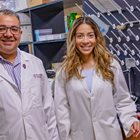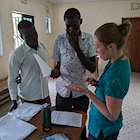His grandmother’s battle with breast cancer when he was in college impacted Bradley Creamer, PhD, profoundly. Years later, it inspired him to dedicate his career to helping others facing the disease. He was first drawn to cancer research when he applied for the doctoral program at University of Nebraska Medical Center. He continued his education in cancer biology by serving as a Ruth L. Kirschstein National Research Service Award Postdoctoral Fellow at Vanderbilt-Ingram Cancer Center.
Now, 20 years later, the professor of physiology at Kansas City University (KCU) is working to understand why tumors and the cells within those tumors sometimes become resistant to chemotherapy drugs. Working in collaboration with Jeff Staudinger, PhD, KCU chair of basic sciences and professor of pharmacology, Creamer has identified some potential pathways that may lead to drug resistance in certain types of breast cancer.
“There are a number of proteins and enzymes that are often dysregulated in cancers, especially as treatment progresses. The overarching goal of our lab is to understand what some of those proteins and enzymes are that can lead to chemotherapeutic resistance,” Creamer explained. “We know it's not going to be one, or two, or probably even a hundred, but there are certain ones that we see more often in tumors that are involved in the metabolism of some chemotherapeutic drugs.”
Creamer explains that target proteins control the response or kinetic behaviors of drugs within organisms. He and the team are looking for novel targets within that pool of proteins or enzymes that could be targeted to help alleviate some of the chemotherapeutic resistance that can develop. “There's a really interesting pathway of metabolic proteins and enzymes that normally function in the liver to help remove toxins and other xenobiotics, including pharmaceutical drugs, from our bodies” he said. “Recent studies, including data from our lab, indicate that some of these same proteins and enzymes that function normally in our liver are dysregulated in some cancers, meaning they're there and they shouldn't be.”
Recently, the team’s efforts were rewarded when they were selected for a research enhancement award (R15) of $420,000 from the National Institutes of Health’s (NIH) National Cancer Institute. These competitive awards are geared toward funding well-designed projects, while also encouraging and supporting student-engagement in research, in an effort to increase students’ experiences in the lab.
“This award will position KCU for additional, and possibly even more lucrative grant opportunities down the road. It’s a building brick in our University’s growing research infrastructure,” said Creamer.
Creamer adds that the nature of research is answering one question, or part of a question, and opening the door to more questions. And while they don’t expect to solve the chemotherapeutic resistance of all cancers, they could very well find clues to one cancer. “Our hope is to find possible targets for therapies that will improve patient outcomes for chemotherapeutic-resistant tumors,” he added. “That’s significant, especially for breast cancer, because it's a chemotherapeutic-resistant metastasis that spreads to other organs and can no longer be treated by chemotherapy that leads to death. Identifying potential targets that can be drugged in some way, either prior to or following chemotherapy, to help make them chemotherapeutic sensitive, is the ultimate goal.”
Offering students research opportunities like this not only gives them a competitive advantage when preparing for residency positions, but also helps them become better clinicians when they begin practicing in their fields. “When students have research to complement their studies, they aren’t just learning how to treat their future patients, they are learning the why,” said Creamer.
In his 20 years of cancer research, Creamer has witnessed an evolution of treatments and personalized medicine. Though the number of people diagnosed with cancer hasn't changed much, the outcomes have improved significantly. “There are still those who have chemotherapeutic-resistant cancers,” he said. “We hope, one day, we might identify some of the ‘why.’”
(Research reported in this publication was supported by the National Cancer Institute of the National Institutes of Health under Award Number R15CA287338. The content is solely the responsibility of the authors and does not necessarily represent the official views of the National Institutes of Health.)
_20240417152228_0.png)



(0) Comments